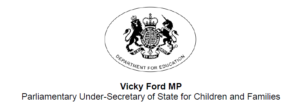
Minister Ford has issued an open letter to all parent carers ahead of children returning to school on Monday 9th March. It includes clarity on what to expect and what is expected. The message is the same as the local one- schools should talk to parent carers and parent carers should talk to school to find a way to address any worries or issues.
Attendance is mandatory.
It is possible that a small number of pupils and students will still be unable to attend school or college in line with public health advice to self-isolate because they:
have symptoms or have had a positive test result;
live with someone who has symptoms or has tested positive and are a household contact;
are a close contact of someone who has coronavirus (COVID-19); or
have been asked to shield by their GP or health professional. In the above circumstances schools and colleges are required to provide remote education for pupils and students.
Minster Ford goes on to say “I recognise that some pupils and students with SEND may not be able to access remote education without adult support and so we expect schools and colleges to work with parents and carers on this. Further details on delivering remote education for children and young people with SEND is set out in Remote Education Good Practice.”
The Remote Education Good Practice Guide, Section 4, is particularly helpful:
4. SUPPORT: identify pupils who are at risk of disengagement (including absence or poor behaviour), and provide specific support
Many pupils are likely to need some social and emotional support on their return to school. Some pupils will need extra support, such as those who have previously had poor attendance or fixed term exclusions as well as those new to the school, with special educational needs and disabilities (SEND) or who have not engaged with school during the coronavirus (COVID-19) outbreak.
Engage with the parents and carers of these pupils as soon as possible, ideally before the start of the new school year, to set expectations, understand concerns and build confidence.
Make sure Pastoral Leads and Designated Safeguarding Leads have undertaken appropriate training to spot signs of distress and poor mental health. Ensure staff are able to identify where changes in behaviour (for example being fearful or withdrawn, aggressive or oppositional, or excessively clingy) may be an indication of an underlying issue.
Where further support is needed, staff should consider what additional support or reasonable adjustments are needed and put a plan in place to deliver it, with regular points to review. Where pupils already have education, pastoral support or multiagency plans, these should be updated.
Where children have special educational needs and disabilities, work with local services (such as health and the local authority) to ensure the services and support are in place that will ensure a smooth return for pupils.
For children who have a social worker or who are otherwise vulnerable, work with social workers and other relevant services to ensure the right services and support are in place. This includes making contact to discuss re-engagement over the summer and informing them if the child does not attend in the new school year.
